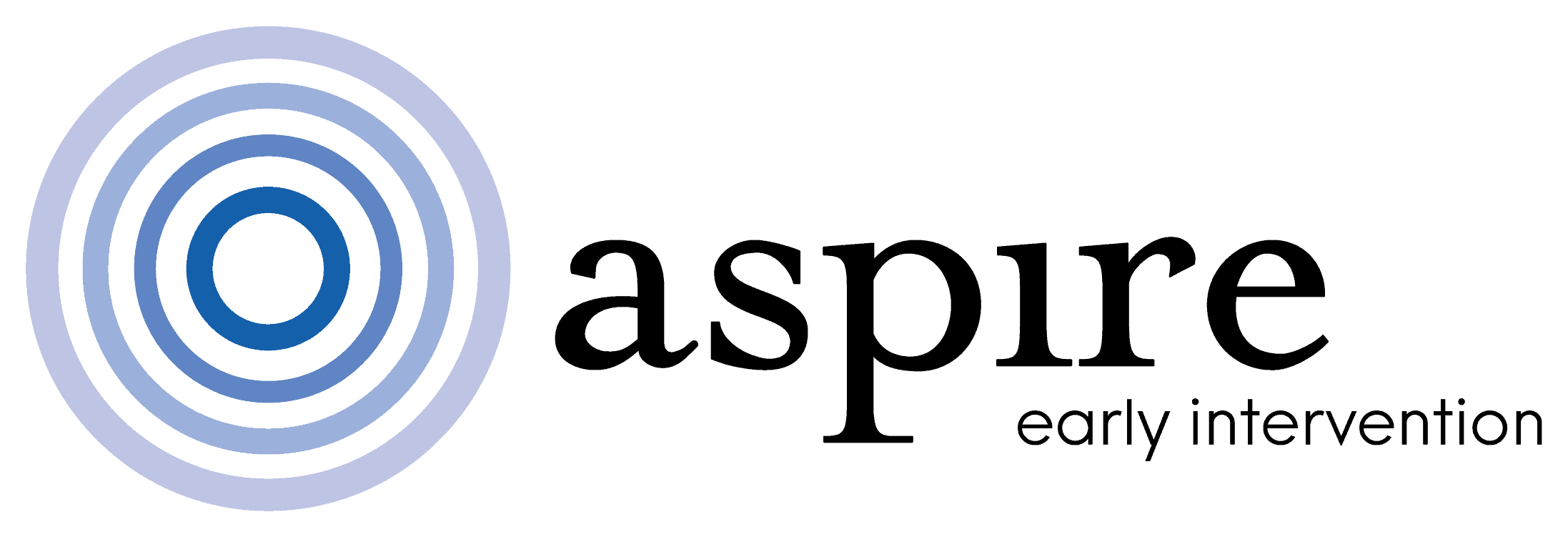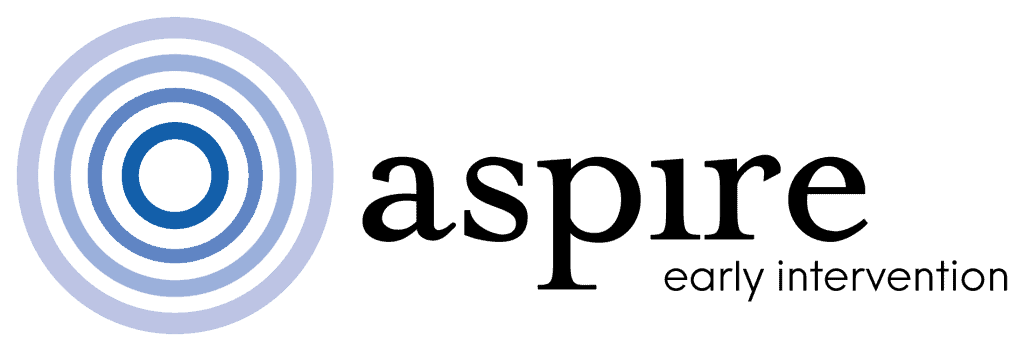If you have any concerns or questions, please feel free to contact us. However, you might just find the answers you’re looking for in our FAQs.
Frequently Asked Questions
Our programs, workshops and training are based on the Early Start Denver Model (ESDM) and Early Intensive Behaviour Intervention (EIBI) techniques.
We’re happy to connect you with Aspire families who have just started, are completing or have completed our programs. Many children we work with transition to mainstream education and test within the normal range on the Autism Diagnostic Observations Schedule and all other language and IQ testing.
We can also connect you with parents of children with similar diagnoses or you can review our family stories.
To access NDIS funding for our services, you must meet one of the three criteria below:
- Have a recognised diagnosis and live in an NDIS area.
- Have a delay in two or more areas (skill, speech/language/communication, motor, play and social).
- Display behaviours that are impeding development in two or more of those areas.
There are two ways to access NDIS funding, depending on your child’s age. If your child is over seven, funding is available via the NDIS pathway. If your child is aged zero to seven, you access funding through the Early Childhood Early Intervention (ECEI) pathway. NDIS eligibility is determined by your child’s diagnosis based on reduced functional capacity in one or more of the following areas:
- Communication
- Motor skills
- Social interaction
- Learning
- Self-care
- Self-management
However, a diagnosis of autism at any level will likely meet NDIS funding criteria.
Medicare and private health insurance also cover some or all associated treatment costs for services, such as occupational therapy, speech therapy, physical therapy and psychological services. Please check with your providers for more information.
You may also choose to privately fund your services if that’s an option for your family.
Yes. Our team is able to provide support for families needing advice and guidance for the implementation of a behavioural support intervention plan that includes restrictive practices.
If you have funding in the ‘CB Daily Living – Improved Relationships’ registration group with the Specialist Behavioural Intervention Support item, we can provide a detailed plan and implement the program alongside your family.
For more information, please get in touch with our team.
Yes, you do not need a formal diagnosis to access our services. Prior to starting a program we’ll conduct an assessment to determine the suitability of our program for your child and family. We specialise in supporting children at risk, or who have not yet received a diagnosis.
We’ll also assess your child’s strengths and weaknesses, demonstrate some techniques and answer any questions.
Alternatively, if you do not currently have funding and your child has a delay in two or more areas (skill, speech/language/communication, motor, play and social) or is displaying behaviours that are impeding development in two or more of those areas, we’re able assist you with completing your Access Request Forms for ECI Pathways. For more information about our NDIS Access Request meetings, please contact our team.
The programs we provide encompass all areas of development and can be implemented for children with any impairment or delay.
While most Early Intervention research focuses on autism, our programs are designed for children with a range of special needs, including global developmental delay, Down syndrome, attention deficit and/or hyperactivity disorder and Williams syndrome.
Our areas of focus:
- Language skill-building based on the Verbal Behaviour Framework
- Fine and gross motor skill building, and muscle strength training, if necessary
- Play skill building, including toy play and functional pretend play
- Social skill building from basic greetings to complex social skills, such as holding a conversation
- Attending skills, such as social referencing, following a parent’s instruction or the ability to complete tasks independently
- Development of Theory of Mind skills
- Teaching Executive Functioning Skills, including flexible thinking and problem solving
- Reducing barriers to learning using techniques including extinction and functional communication
While each program is designed to suit your child’s individual needs, a typical early learner program should include skill-building in pivotal response areas, such as:
- Imitation
- Joint attention
- Object permanence
- Toy play and manipulation
- Social referencing/eye contact
- Attending skills
- Responding to and categorising visual, vocal and auditory stimuli
- Matching skills
- Manding using voice, Picture Exchange Communication System or sign language
- Fine motor skills, such as a pincer grasp and finger isolation
- Gross motor skills, including jumping, hopping and ball skills
- Self-help skills, such as grooming and toileting
While our area of expertise is early intervention, we cater for children aged 6 months to 18 years old.
With the right support, outcomes are usually better when children start early intervention at a young age. This is because they have fewer skills to master in order to catch up to their peers.
At Aspire, our programs are tailored to meet your child’s individual needs. Your program is continually adjusted and revised to ensure we’re always working towards the best possible outcomes for your child.
Our intensive programs for preschool-aged children typically run for two to four years. School-age and home school programs vary between 12 weeks to ongoing support (2- 17 hours a week), depending on the needs of your child.
You’re never required to sign up for a specified time period and services can be ceased at any time.
Yes. We are in the process of expanding our services to offer occupational therapy, speech pathology and psychology. For more information or to express your interest, reach out to our team.
Whether you choose Aspire or another registered provider, you should ensure your child’s program:
- Is individualised for your child’s needs. Don’t accept copied pages from curricula that are commercially available. Make sure the program carries your child’s name and ask whether individual programs are adjusted to your child’s acquisition and learning style. Check that your program provider is comfortable with adjusting teaching strategies and prompting procedures. We also recommend asking that acquisition and behaviour can be graphed, so you can see how fast your child is developing skills and that inappropriate behaviours are decreasing.
- Teaches generalisation as your child is learning. Don’t accept programs that insist on presenting high-pitched or loud verbal instructions to your child and refuse to vary instructions. This is known as “old-style” programming. Contemporary programs teach your child to respond to varied stimuli from the moment the skill is being taught. For example, when learning labelling, your child should be given a varied verbal instruction and an ask, such as, “Look! Can you tell me what this is?”. An expressive labelling program should include an emphasis on teaching your child to comment and share enjoyment as well as following the instruction.
- Is varied in its presentation and teaches in the child’s natural environment as well as using discrete trials. Contemporary programs should apply various techniques to prevent programmed responses. Your therapist should avoid running one program after another and should always encourage natural environment and incidental teaching. This requires more skill and creativity from your therapist.
- Is reviewed regularly by someone who successfully interacts with your child and teaches your therapists how to teach your child. Your program provider should physically interact with your child and demonstrate programs as to assess the necessary prompting and acquisition procedures. They should also have your therapists or you demonstrate techniques and strategies and provide feedback. Your child should enjoy interacting with your program manager on a face-to-face basis. We don’t recommend only videotape reviews, as you cannot give feedback and see the implementations directly with your child.
- Is developmentally appropriate. Ensure your child’s program is promoting behaviours and skills suitable to their age. It should include a healthy balance of social skills, play and functional communication skills, such as requesting and commenting. Always ask yourself, “Is this skill functional for my child’s age and how will they apply this new skill?”.
- Is not limited to basic skills. Ensure your child’s program provider has the skills and knowledge to grow with your child and continually assess and update their developmental goals.
We use the Verbal Behavior Milestones Assessment and Placement Program (VB-MAPP), PEAK and Early Start Denver Model to assess the ongoing development of your child, if appropriate. We also use ongoing behavioural assessments and standardised assessments, where necessary.
In the near future we will also be providing diagnostic assessments such as the Autism Diagnostic Observation Schedule (ADOS).
If you have further questions or would like to talk to one of our experienced practitioners, please contact us.


